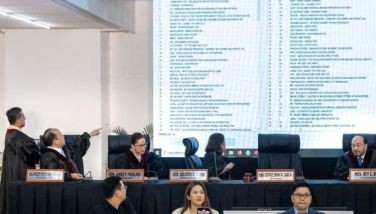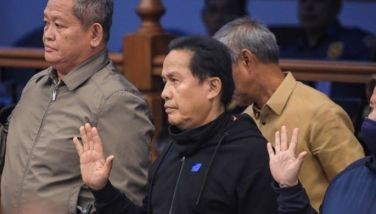RP to ratify optional protocol on UN convention against torture
MANILA, Philippines – The Philippine government will soon accede to the United Nations’ Optional Protocol to the Convention Against Torture and Cruel and Unusual Punishment (OPCAT) that would allow close international monitoring of the country’s detention centers and prisons, Malacañang announced yesterday.
The move is expected to be welcomed by the United States, the European Union, the United Kingdom, and Japan, among others, “since they have been wanting this,” Presidential Human Rights Committee (PHRC) executive director Undersecretary Cecilia Quisumbing said in a statement from Geneva, Switzerland.
Executive Secretary Eduardo Ermita, who also chairs the PHRC, said President Arroyo will issue instructions to concerned agencies to take formal steps to accede to OPCAT.
“The ball has been set rolling. It was one of our last decisions at the PHRC before we left for Geneva for the UPR (Universal Periodic Review) to recommend this (acceding to OPCAT) to the President,” Ermita said.
The executive secretary is leading a 19-man delegation of 11 line agencies for the UPR session on the Philippines at the UN Human Rights Council (UNHRC), including officials from the Office of the President and the Department of Foreign Affairs.
During the review of the Philippines’ human rights record, Quisumbing told the UNHRC that after several meetings over the months, the PHRC arrived at a consensus to send a recommendation to the President for the Philippines to become State Party to this key treaty.
The country’s accession and ratification to the OPCAT was also brought up by Korea, the United Kingdom and Slovenia during the UPR session, she
said.
“The memorandum to the President has already been prepared,” Ermita said in the statement. “But because Undersecretary Quisumbing had to rush to the hospital just before our trip, she was not able to send it on. We will forward it to the appropriate office as soon as we arrive. And then, we will soon have a new addition to our commitments to the HR legal system.”
Quisumbing said the OPCAT was meant to strengthen implementation of the Convention Against Torture to which the Philippines has been a State Party for 22 years since 1986, “so it is also in our national interest to be a party to this instrument.”
The Convention Against Torture and other Cruel, Inhuman Degrading Treatment or Punishment covers physical, emotional, psychological and mental abusive acts. When committed by agents of the state for the purposes of coercion, it is called torture. Such acts, committed by all other persons, and for any motive fall under the latter, broader term “Cruel, Inhuman Treatment or Punishment.”
The Optional Protocol to Convention’s objective is to establish a system of regular visits undertaken by independent international and national bodies to places where people are deprived of their liberty, in order to prevent torture and other cruel, inhuman or degrading treatment or punishment.
It also requires State Parties to establish independent National Prevention Mechanisms, not only to investigate reported incidents but also to put measures in place to prevent torture.
At the closing of the UPR on Friday, the Philippine government committed to continue to work on improving the human rights situation in the country following “shared concerns” by members of the UNHRC on various issues, including extrajudicial killings.
Ermita said that among the efforts to be pursued by the government are:
• to continue to develop a gender-responsive approach to all issues on women and children, including in the judicial system and on violence against women and children;
• to continue to develop domestic legislation for further protection of the rights of the child;
• to maintain the momentum on addressing killings of activists and media; and
• to continue and find additional measures to answer the basic needs of the poor and other vulnerable sectors.
“The Government of President Arroyo’s commitment to human rights remains paramount even in the midst of active insurgencies and other threats to national security. In fact, human rights promotion and protection is a key feature in the peace processes currently being pursued,” he said.
- Latest
- Trending





























